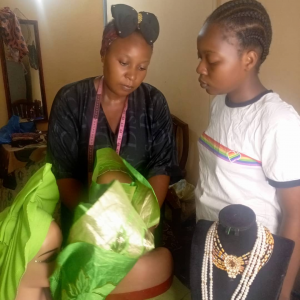By Uchechi Edozie
Marginalized girls face numerous barriers that limit their access to education, economic opportunities, and overall empowerment. These barriers often perpetuate cycles of poverty, making it difficult for them to envision a brighter future. However, skill acquisition programs tailored specifically for these girls can be transformative. By equipping them with essential skills, we can help close poverty gaps and foster greater social equity.
Skill acquisition is the process through which individuals learn specific competencies that enhance their employability and foster personal development. For marginalized girls, gaining skills can provide pathways to economic independence and improved quality of life. Skills can range from vocational training in areas such as sewing, cooking, and computing to soft skills like communication, leadership, and critical thinking.
Education is a fundamental cornerstone for breaking the cycle of poverty. Unfortunately, many marginalized girls are deprived of basic education due to various factors such as socio-economic constraints, cultural norms, and early marriages. Skill acquisition programs that are integrated with educational initiatives provide a dual benefit. They not only impart practical skills but also create a conducive learning environment where girls feel safe and supported.

Programs focusing on STEM (Science, Technology, Engineering, and Mathematics) education encourage girls to engage in fields traditionally dominated by men. By fostering interest and competence in these areas, we can empower girls to pursue careers with significant earning potential.
However vocational training plays a crucial role in equipping marginalized girls with marketable skills. Programs that teach skills such as carpentry, plumbing, or digital literacy open up job opportunities that can lead to financial independence. For instance, girls trained in tailoring can turn their skills into small businesses, allowing them to generate income and support their families.
Success stories from J and J fashion home highlights the impact of vocational training. programs teaching sewing and crafting skills have helped thousands of girls start their own businesses, significantly improving their socio-economic status.
For skill acquisition programs to be truly effective, community support and involvement are crucial. Engaging parents, local leaders, and organizations can help alter perceptions and attitudes about girls’ education and empowerment. By creating a supportive community environment, these girls can benefit from collaborative networks that provide mentorship and job opportunities.
Creating awareness about the importance of investing in girls is essential. Communities that recognize the potential of their daughters contribute to closing gender and economic gaps. Workshops, seminars, and outreach programs can educate families on the benefits of skill acquisition and the role women play in local economies.
The journey to closing poverty gaps through skill acquisition for marginalized girls requires a multi-faceted approach. Governments, non-profit organizations, educators, and communities must work collaboratively to develop and implement effective programs. Investing in marginalized girls is not just a moral imperative but a strategic approach to fostering sustainable development. Ultimately, investing in the skill acquisition of marginalized girls is a powerful means of breaking the cycle of poverty and building a more equitable world for all.

Uchechi Edoziem is the Gender Desk Officer for GirlupAfrica